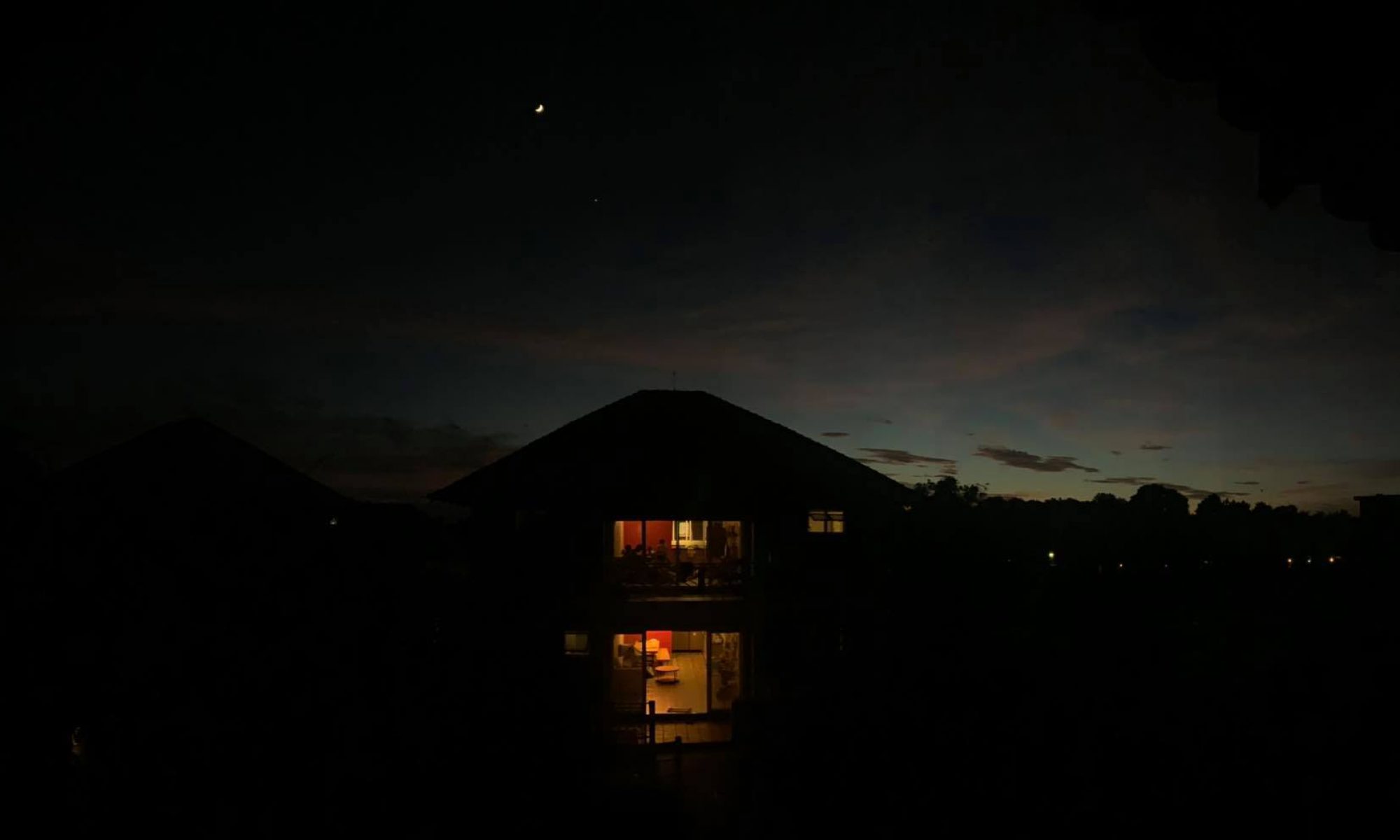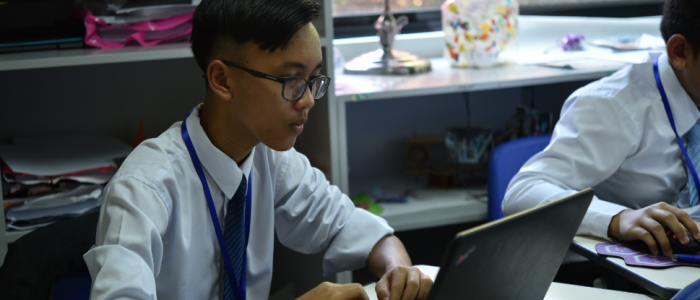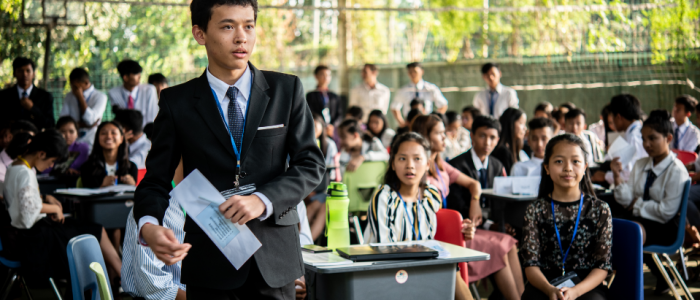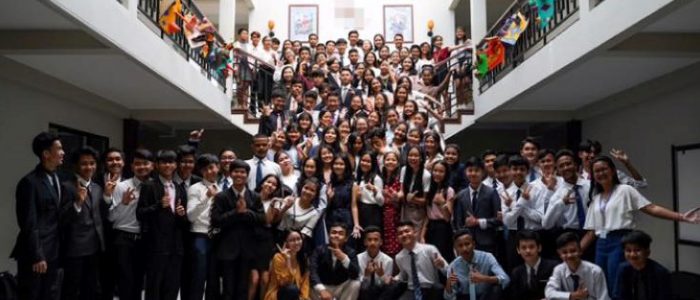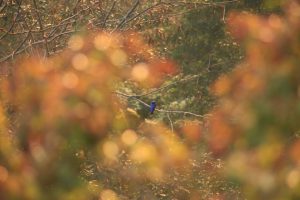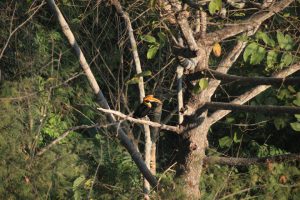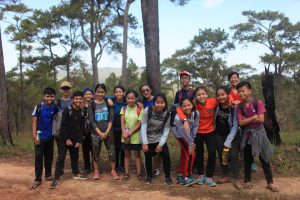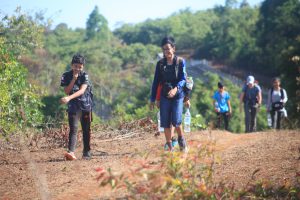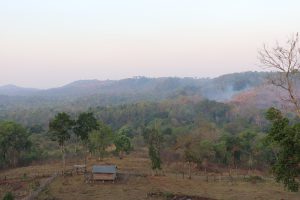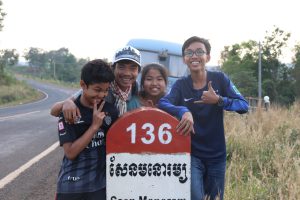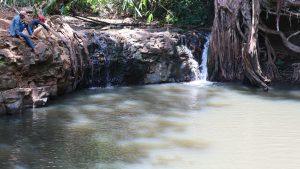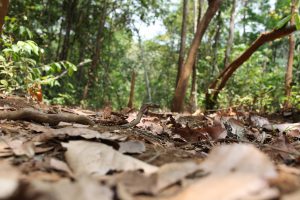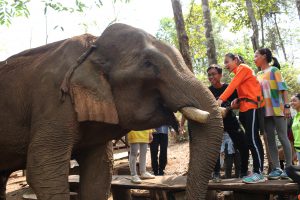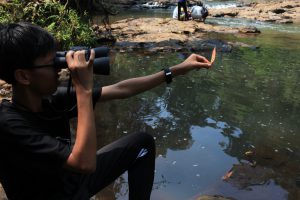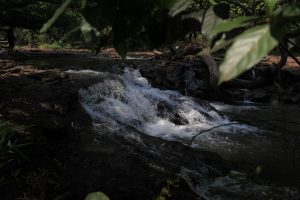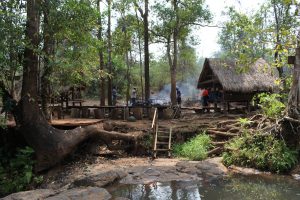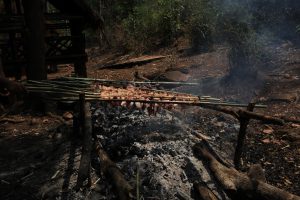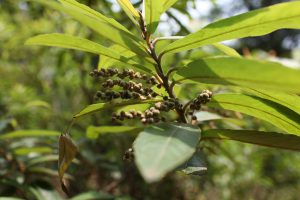https://drive.google.com/file/d/1O9XZdbKxRbL3m1gsUNdr4FwnSFjhAPJ4/view?usp=sharing
Khmer Model United Nation
Have you ever heard of the Model United Nations? If not, that is fine, Model United Nation (M.U.N) is a model of the annual conference of the United Nations. The conference discusses different topics or issues around the world with the honors of delegates from many countries together. MUN is pretty much the same. It is an educational simulation for students to understand the world-issues, international relations, especially to experience the United Nations (UN) conference.
There have been so many MUN conferences happening before but guess what, it has only been in English. So, our facilitator along with some of our students thought of a very unique idea. We wanted to make the first-ever MUN in the Khmer language. The purpose of this was to teach us, the Cambodian students to understand the use of professional language in Khmer, and also provide the opportunity for the other millions of Cambodian students out there who only know a little bit of English or can not understand the language. With the Khmer version being made, they can understand and experience the same as the casual conferences but with their own language.
There have been a few times where the Khmer MUN is being held in our school with our students and a few other schools. But there has not been any time where every student has participated together yet. With all the preparations and research, we made it possible and had the Khmer-Model United Nations conferences participated by every student in our school. Well, there are only a bit over 100 students in our school, if you do not know yet, and wonder how many students are there. Feel free to know more about our school with the website: http://www.ligeracademy.org/
There were four general conferences along with a security general conference. Each conference had two topics to discuss. I was the delegate of the Kingdom of Cambodia under the topic of “Legalizing the same-sex marriage” and “Drug Trafficking”. We had plenty of time to do research and practice our speeches. It was my first time experiencing MUN and I was very excited.
The first day of the Khmer Model United Nations. Everyone dressed professionally in suits and was looking very good. When it came to the opening speech, I was the first one up because of the alphabetical order in Khmer. I could not tell how excited, and I was a bit nervous, to be honest. But I made it in the end, and I was so proud and congratulated myself for finishing the first main job of the day. Everyone’s speech was very professional and got the job done with quality. After all the opening speeches, everyone worked with different delegations on finding resolutions to our topics as some agreed on the topic and some did not but we had to discuss the topic and find the right resolutions.
The second day was the debating day. Well, it wasn’t like a debate, it was made to be more like a discussion where the main submitters presented their resolutions and the other delegates ask questions and discuss one by one. I got myself the opportunity to ask and gave a few speeches as well. We could not talk with anyone but sending letters through the admins of the conference.
At the end of the day, everyone came together to do the full conference with the other final topics. Here came the fun part as we finished the event by having a quiz night and the ending ceremony in which the facilitators gave their impressions along with the chairs, and delegates.
Overall, it was a magnificent experience to be part of the conference, to take the opportunity to know more about the real-world issues, and to understand the concept and what it was like to be in the United Nations meeting.
Thank you very much for your time reading my portfolio, if you have any questions, feel free to contact me or comment it down. Have a great day!
Math – Round 2
Since October, I’ve been focusing on systems of equations, inequality, and function. The areas that I feel I learned very strongly are something like graphing, writing equations from graphs or tables, the average rate of changes, minimum/maximum point, and some word problems. I often feel like I really need to improve on word problems because, one is the language, sometimes, I need more time to understand what it wants us to do. Word problems are something that is challenging for me but as I experienced, I got better at it the more I do and practice those word problems. In class, what I think I did well was working with friends – helping each other, and doing exercises in teams. Having work done on time as well as working on my own speed to make sure I understand. I usually don’t ask many questions until I practice it, then I’ll have some thoughts in mind to ask – either Jeff or my friends around me.
My goal for this round and the following rounds for the rest of the school years. Umm. Number one is to have better planning on homework, Khan specifically. Let’s say, the Khan is due one week from today, and there are 14 sections in the unit. So, what I need to do is to have a goal of doing it every day, two sections per day; something like that for planning. I also need to ask more questions in class related to the content. Even though I might not have any questions but I should ask to clarify or something like that to understand more.
It’s been great working with you and everyone in the class because I’ve learned much new stuff or reviewing something I’ve learned before in the government school but I forgot to get it back into my brain. I hope to achieve my goals and continue to learn more about math!
Refugee Narration – Inspired by “Inside Out and Back Again” by Thanhha Lai [English Literacy]
Let’s rewind back to last year during our first round of English literacy class. I was excited as soon as I knew the theme of the round was about Refugees. According to the United Nations, there are over 70.8 million refugees on this planet, and 30 million of them are under the age of 18. Even though it is just a small amount compared to the entire population, if all the refugees were the population of a made-up country, they would be ranked as the 20th most populated country.
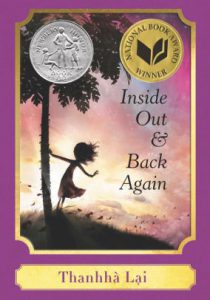
Let’s get back to what we did in our class. Have you ever heard or read a novel Inside Out and Back Again by Thanhha Lai? The author quoted the novel’s description, “Inspired by the author’s childhood experience as a refugee—fleeing Vietnam after the Fall of Saigon and immigrating to Alabama—this coming-of-age debut novel told in verse has been celebrated for its touching child’s-eye view of family and immigration.”. I really enjoyed spending time working on this theme and learning about what happened to the country and the citizens, the hard times of refugees, and the lives of many during the war.
To take the lesson into the perspective, we had been assigned to make our own novel poem. We discovered many stories of the refugees around the world and wrote our own poems inspired by them. I was influenced by a story from Afghanistan, but I won’t spoil the story here, I would love you to read it at the end of this article.
To sum up the lesson I’ve learned from the experience of the refugees, the information, and lives during a really tough time like them made me imagine the perspective of myself (e.g. what would happen if that ever happened to me? What would that change my life? How would the country be like?). I suggest you read the novel if you are interested and below is the poem I composed. I really hope you enjoy reading and explore around in my portfolio, thank you, and have a great day!
INSIDE OUT
(Mimmy = Munny)
My name is Munawar,
I am 18 years old,
And I am from Afghanistan.
I fled because of the notorious Taliban,
Dropping bombs,
Making bullets rain,
Is peace possible with the Taliban?
I was lucky enough,
To live in a safer place,
But still controlled by the Taliban,
We still can’t live peacefully,
They did not allow me,
And even my friends to work,
So, LIFE is like NOTHING!!
After my 18th birthday,
Mimmy told me to go to Paris!!
One day before leaving,
I spent all my times,
With my family,
Including my parents,
Grandma,
Grandpa,
And I couldn’t imagine leaving
Every one of them!!
The next day has come,
And I had to say goodbye!
The personnel carrier came to pick us up!
It’s hard to describe my feeling,
Mixed of joy and sadness,
I was so happy and full of joy,
But at the same time,
I felt so sad and sorrowful,
To leave everything behind.
While going to the airport,
We faced the people at the office of the organization,
Asking us in English to test us,
I knew if I speak English,
I’ll be in trouble,
I was scared,
My hands are shaking,
But I pretended to not speaking,
And replied,
“No…..Anglis”, which means no English!
I was sitting in there for a moment,
I wrote a diary with my extreme feeling,
Here’s what I wrote my mimmy;
Sitting here is not easy,
This is making me feel like once again,
I am accused of an offense, a treason,
Dear mum, these guys have the same rough attitude,
As the people who were interrogating me,
At the beginning of my imprisonment,
Do you think I will survive a new life with such a start?
I didn’t know how to describe my feeling!
I got out of the military check,
But still a little nervous,
I started to feel more relax and happy,
And, even more, when arriving at the airport,
I was given Coca-Cola,
Salmon,
Eggs,
Steak,
Chicken,
Tomatoes,
Which I haven’t seen and taste for YEARS,
And it was all……YUMMY!!
We flew from Saravejo,
To the incredible Paris!
In Paris,
There’s electricity,
There’s water,
There’s Gas,
There’s everything,
There’s LIFE,
And once again, it’s INCREDIBLE!!
I caught sight of the iconic Eiffel Tower,
Arc de Triomphe,
Cars,
Houses,
Roads,
People,
And….LIFE!!
I’ve written a diary to my Mimmy,
Describing the beautiful,
INCREDIBLE,
Paris,
And how Paris welcomed me.
But I always wondering,
Can a glimmer of the light in Paris,
Ever illuminates the darkness of Saravejo,
So Saravejo can be my INCREDIBLE life as well?
Cambodian Youth Outdoor Leadership Program – Part I
What do you think we should do to make a positive change? You might think of making rules, policy, educate people, talk to them about the consequences, etc. Well, you are not wrong. Here’s something you might not think of. For us, to make a change, changing people’s behavior is the most important. Why? Imagine, if your friend doesn’t like to exercise, for example. If you force or make rules for him/her to do exercise, they might do it, but they might not like it, though. But, if you encourage them or inspire them, long enough, the change will happen, by their behavior! You might think that it’s hard – yes, it is hard! A change will never happen overnight, it takes time, gradually step by step. But why are we talking about changing here? Is it related to the content? To find out, please enjoy reading the post till the end!
Last year, we had an exploration called Outdoor Leadership, which we learned about outdoor skills in different areas then went out to the outdoor world to explore more. And this year, we created another exploration similar to that, which is called the Cambodian Youth Outdoor Leadership Program. Our mission statement is to empower Cambodian youth to be outdoor leaders and environmental stewards by introducing them to natural spaces, raising awareness of conservation threats, and nurturing the passion and skills needed to positively impact their communities.
So, we divided into four sections in the program which are Leadership, Nature Appreciation, Wilderness, and Medical and Risk Management. I was in the Nature team. We were focusing on how to make the participants changed their thought on nature. We had several fun activities for them to enjoy while learning at the same time.
After having the activities and the workshop planned out. We had time to practice the workshop with students at our school, the Liger Leadership Academy. Then, we had our workshop with the students from Kampuchea Action to Promote Education (KAPE), as well as with Happy Chandara School. It went pretty well, and I think it was a great experience sharing what we do and went through the workshop smoothly. The students were really engaged and enjoyed our workshop as they had a lot of fun, and get new outdoor, and leadership skills and understanding more about nature and our program.

Leading in a workshop is not only what we do, but we also need to get more skills in leading participants on outdoor trips. We went on a trip to the highest mountain in Cambodia, Aural, Kampong Speu. It was one of the hardest climbs but; the best view comes from the hardest climb, right? Not just enjoying the hiking, and views of nature, we learned many skills, specifically about being a leader on the trip. Our facilitators shared the experience, we practice managing parts of the trip and leading the group hiking. It was really enjoyed doing that and gain more skills in leadership, as I got good feedback from my facilitators as well.
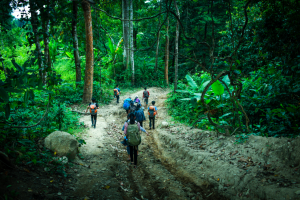
That was everything from the round. Planning/outlining the workshop, implementing it, giving workshops, and practice leading a trip! We had more exciting stuff we did, if you want to know more, stay tuned and part II will be posted soon! Thanks for reading!
Electricity in Cambodia
Imagine living without electricity in the 20th century. Most people will think without lights, fans, air conditioners, life is nothing without it. Well, there are still many people in Cambodia, especially in rural areas that still do not have access to electricity. When I entered an exploration called “Electricity in Cambodia: Economy, Energy & Access,” I learned more about how people live with and without energy, current electricity status in Cambodia, and how people use electricity.
I didn’t know where all the energy I use every day comes from before joining this exploration? I wondered why we got blackouts, particularly last year during March & April? Is there enough electricity we produce? From which country do we import electricity? What are different ways of making electricity for people living off-grid? I was wondering so much, but I gained more understanding and knowledge at the end of the discovery than I expected.
Cambodia is one of the world’s fastest developing countries, including electricity, which is an important development section. And for me, learning and understanding about this is very important. Talking about electricity in-class study is useful, but what has helped more is going out to various places to meet experts and people who have experienced electricity-related.
We have had an exciting opportunity to meet a person from EnergyLab, a company working in Cambodia to create clean energy. I’ve learned a lot about Cambodia’s electricity lab and a lot of information as well. He led us to see the ISPP solar farm, and the first time I realized that the solar system helped the school so closely related to electricity, it was surprising to me.
We had another chance to visit an off-grid village in the province of Kampong Speu. While being an off-grid village, people living there are using solar energy from a company called OkraSolar. OkraSolar is a company providing off-grid people with solar energy. We’ve been to meet some solar-using villagers and guess what? Solar power is very helpful and they feel like it; solar power makes life easier and better.
We also had the opportunity to meet the BlueCircle, a company that provides wind power to countries in Southeast Asia in particular. We have no wind power yet in Cambodia, but the company plans to have it on Bokor Mountain, Kampot Province. They’re still learning about the wind speed, the climate, and the environment in general, but their goal is to start building it as soon as possible. It would be a very useful source of electricity for Cambodia because it is one of the most efficient electricity sources.
Since I learned a lot from this exploration and how important electricity is to the world, I started thinking more and using it wisely because it is not so easy to produce. But as the production of electricity is increasing, I believe there will be fewer blackouts as time goes by, and we will have enough electricity to power the country.
Here’s the link to the final exploration video. Enjoy!
Cambodia Electricity News Exploration (Liger Leadership Academy)
Happiness – English Literacy (Round 4)
Every round of English Literacy, we learn different themes and “Happiness” is the theme for this round. The big ideas of the themes are to define happiness, how can we achieve happiness, which is essential to ensure happiness, and what is the nature of happiness.
To begin the round’s theme, we watched a video about a man who was called Mr. Happy Man. So, Johnny Barnes (Mr. happy man) was a native Bermudian man who performed a daily ritual of standing on a street corner in Bermuda’s capital city of Hamilton to shared positive affirmations to passers-by since 1986. If you want to watch the video about him, click here. What I learned from that video was how people can be very happy and motivated by positive affirmation. Also, when you make someone happy, you’ll be loved by all of them.
Besides that, we also read a few articles about different ways of happiness, significant details about happiness in the articles, and how can we achieve happiness. And now, I am writing an essay about how to be happy when you don’t have friends. The essay is still in progress of editing so if you are interested in reading it, please stay tuned and I’ll post it in just a few weeks. What I think of the essay is that even though you face problems, there are so many different ways to be happy.
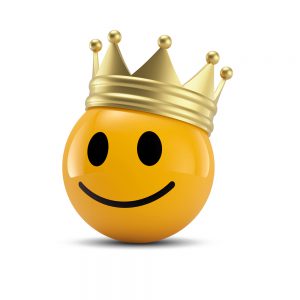
Technology – Round 4
Python is one of the programming language that is used in computers. In this post, you’ll get to know how I felt about coding and my favorite lesson.
My favorite lesson was about Python lists. Python lists is a lesson about how we can store item in a list or making a list of something. After spending times learning and exploring around, I knew how to change item value, loop through a list, check the list, and add or remove items. To practice, we learned how to create two random teams from a list of players. Code Club is a website that helps us to practice the exercise. If you’re interested and also want to learn how to create two random teams from a list of players, click here.
First, I thought that learning python or coding in general was hard and complicated but it was actually not. It was hard at first just because I knew nothing about it and it looked complicated. After learning, I enjoyed coding and exploring around and even wanted to learn more coding lessons.
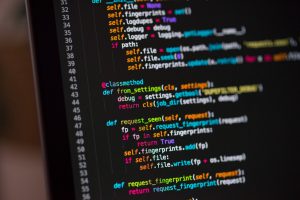
Outdoor Leadership!
Outdoor Leadership is an exploration that we learn about the out world, living in outdoor with technology, technical outdoor skills, risk management, wilderness first aid, etc. If you want to know more, please read until the end!
The first week of this exploration, we focus on Nature. We defined what nature means to us and we did a sit-and-spot activity to observe nature and thought what nature means to me.
Another outdoor skill we learned was Navigation. It was about the understanding of the map, how to read the compass, and also to know the direction by using an analog watch and the sun, the star, landmarks, and natural vegetation! The activity that I did relate to that was that I drew a map of my school campus, including legends, direction, symbols, etc. Then, we need to write the instruction of where I want my friend to go. It was a fun activity and we also learned at the same time!
Then, we started to talk about the good ways to pack your stuff for outdoor trips. We learned about needs vs wants, group gear, and personal gear, the right way to pack your backpack, etc. After that, we prepared to go on our first trip!
On the 7th of March, we went to Kirirom national park. We needed to walk on the long trail to the heaven cliff. We got to see the view from the heaven cliff, we saw many birds especially hornbills, we had dinner around the campfire, collected many pinecones, saw many different plants, got to see the sunrise, we did the sit and spot, we sang together, we played some fun games, and observed a lot of natural stuff. We hiked 18km for both days. We had really great collaboration, respect, risk-taking, stewardship, and we learned a lot in outdoor and we had fun times together!
When we came back, we did a group reflection and shared something we learned! Then, we learned more new lessons about risk. It was about risk management, assessing risk, and actual vs. perceived risk.
Another important lesson I learned was about wilderness first aid. We learned about the Patient Assessment System, Primary Patient, etc. Then, we did an activity. We divided into team and we had different roles (patient, lead rescuer, assistance rescuer). The patient pretended to be injured in a different situation and both rescuers had to help the patient by using the wilderness first aid rules. I learned so many things and I think that it’s very import to know whenever you go outdoors.
And then, we’re going on a trip again! We went on a 3-night journey to Mondulkiri and the experience was supercalifragilisticexpialidocious! During the trip, there were many inquisitive bird watchers who would grab hold of the binoculars whenever they saw birds, passing their sight. Being surrounded by the wilderness allows us to discover more about nature in this magnificent country. Ultimately, they’ve been showing different leadership roles throughout this jaunt.
“The more you go out, the more thing you’ll find and learn!”
Math – Round 4
Mathematics, as known as Math is one of the basic, important, and my favorite subject. I felt so enthusiastic about the class and shows a lot of appreciation, and now, I realize that I love Math than I thought since I was very young.
For this round, we studied with two leveled books at the same time since the two levels are similar. The books that we learned were Primary Mathematics 5B, and 6A. We get to learn mostly about percentage, angles, and triangle. Now, I know how to convert percentage into fraction or decimal, I know the different types of angles and triangles. We did many exercises and activities in group and it improved my teamwork and communication skills.
For me personally, I think that even though it’s Math class but we still get many skills, too. I hope to learn many new lessons in the next round and stay tuned, there will be more post coming soon! Thanks for reading!
